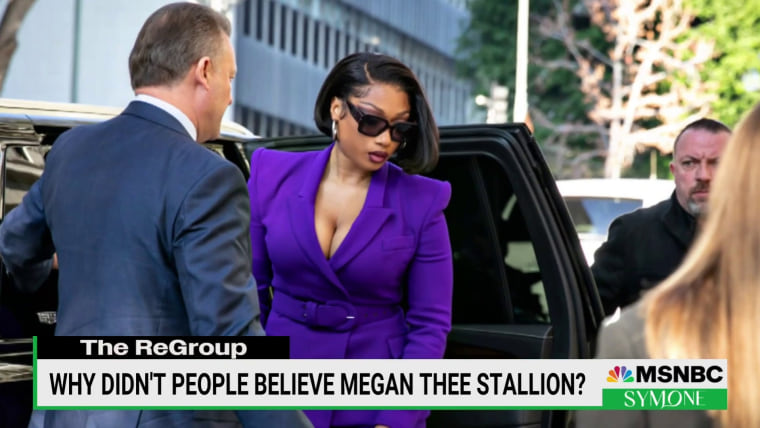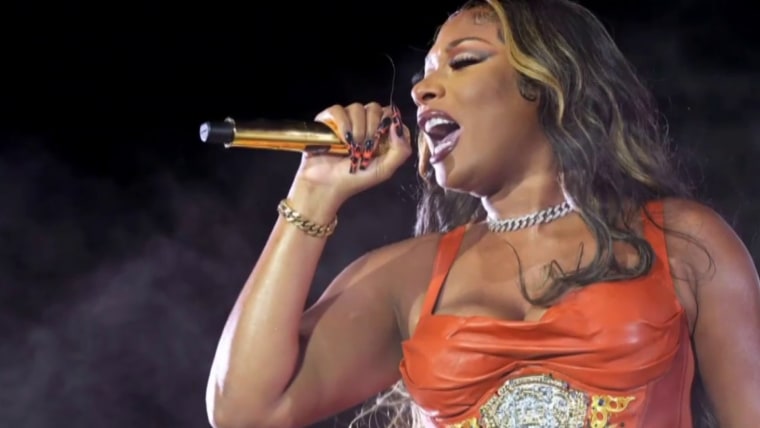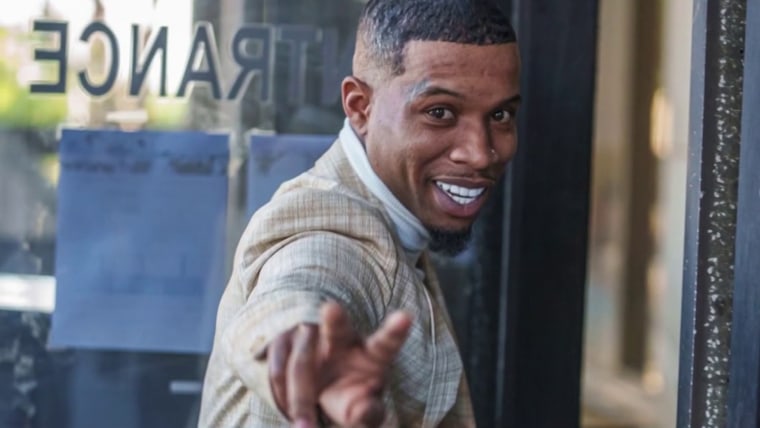More than seven months after hip-hop recording artist Tory Lanez was convicted in the 2020 shooting of hip-hop megastar and three-time Grammy winner Megan Thee Stallion, a judge sentenced him Tuesday to 10 years in prison. In December, a Los Angeles jury found the Canadian-born Lanez, whose real name is Daystar Peterson, guilty of three felony counts: assault with a semiautomatic handgun, unregistered firearm in a vehicle, and discharging a firearm with gross negligence.
I find it difficult to celebrate this golden anniversary. Because even though it’s turning 50, hip-hop doesn’t seem to have matured.
The 10 years Los Angeles County Superior Court Judge David Herriford gave Lanez Tuesday was less than the 13 years requested by prosecutors.
On Monday, the first day of Lanez’s sentencing hearing, Los Angeles County Deputy District Attorney Kathy Ta read into the record a statement from Megan: “Since I was viciously shot by the defendant, I have not experienced a single day of peace,” she wrote. She also wrote, “Slowly but surely, I’m healing and coming back, but I will never be the same.” Megan testified during Lanez’s trial but said in her statement that she eventually decided not to appear at the sentencing because she “simply could not bring myself to be in a room with Tory again.”
The 10-year sentence is an appropriate one. It sends a message that you can’t harm someone and not be held accountable. This is Lanez’s own doing, and now he will have about a decade to reckon with that.
Lanez’s sentencing is the latest development in one of the most contentious periods in hip-hop history, when many of the most notable men in the genre chose to rally around a fellow male artist accused of violence and not a fellow female artist who said she’d been shot by him.
What does it mean for Black women fans of hip-hop that, at the same time the 50th anniversary of the art form is being celebrated, one of hip-hop’s biggest stars continues to see hip-hop’s biggest influencers rally around her assailant, put her on virtual trial and find her guilty?
As a Black woman who remembers sneaking into my cousins David and Eric’s room as a kid to learn the lyrics to “It Takes Two” by Rob Base & DJ EZ Rock, I find it difficult to celebrate this golden anniversary. Because even though it’s turning 50, hip-hop doesn’t seem to have matured.
In his song “Circo Loco,” a collaboration with fellow rapper 21 Savage, Drake called Megan a liar. “This b—- lie about getting shot but she still a stallion … she don’t even get the joke but she still smiling,” Lanez’s fellow Canadian rapper sings. Drake was one of several prominent men in hip hop who accused her of lying. Hip-hop podcasters and bloggers, including Joe Budden and DJ Akademiks, used their large platforms to vilify her. (Budden later apologized for joking about Megan’s mental health as he doubted her claims of being shot by Lanez.)
Future NBA Hall of Famer LeBron James went out of his way to let us to know he’s Team Lanez. Responding to a tweet that claimed Lanez makes good music, James responded, “FACTS!!! He never misses. That boy talented as hell man! Bangers for days!!”
Akademiks and Megan engaged in a heated exchange on social media. Before a scheduled pre-trial court hearing even began, Akademiks falsely claimed on Twitter that there’d been a bombshell revelation that exonerated Lanez. Megan tagged him when she responded on Instagram, “Y’all tryna win a social media campaign this is MY REAL LIFE! Y’all tryna get retweets SPREADING FALSE NARRATIVES!” As recently as last month, Akademiks said he still has his doubts that Lanez is guilty.
Black women are three times more likely than other women to be killed by current or former partners. Even if Black people don’t know that exact statistic, they likely know of Black women who’ve been hurt or killed by their partners. That’s why I never bought the idea that the hip-hop community believed Megan was lying about what she said happened to her at the hands of someone with whom she’d been intimate with.
Black women are three times more likely than other women to be killed by current or former partners. Even if Black people don’t know that exact statistic, they likely know of Black women who’ve been hurt or killed by their partners.
I figured the hip-hop artists dogging Meg knew she was telling the truth but succumbed to what can be an overwhelming sentiment that we must protect and defend Black men at all costs: even when Black women and Black children are the victims. I mean, isn’t that why so many refuse to stop supporting R. Kelly?
In my lifetime, I don’t think I’ve ever seen Black people overwhelmingly stand with Black women victims when their assailants are Black men. And that makes me sad.
That idea that protecting abusive men is more important than protecting or defending the abused makes it harder sometimes to rock to the beat. Because this isn’t hip-hop’s first account of intimate partner violence or men in hip-hop attacking women in general. There were stories in its earlier years — such as Dr. Dre’s 1991 assault of Dee Barnes, a journalist whose only crime was being a Black woman who was good at her job. According to media reports, Dr. Dre assaulted Barnes because she’d previously interviewed former NWA member Ice Cube and, in his segment, Cube had less than flattering remarks for his former bandmates. Instead of addressing Cube, Dre took his frustrations out on Barnes. Dr. Dre pleaded no contest to attacking Barnes and was given two years probation and some community service. “It ain’t no big thing. I just threw her through a door,” Dr. Dre said of Barnes then in an interview with Rolling Stone.
In 2015, the film “Straight Outta Compton” was rightly criticized for leaving out Dr. Dre’s attack on Barnes and the allegations of abuse from R&B singer Tairrie B and Dr. Dre’s former girlfriend, R&B singer Michel’le. That’s when Dr. Dre finally paid lip service to owning up to what he’d done. In a statement to The New York Times that year, he blamed alcoholism and said, “I apologize to the women I’ve hurt. I deeply regret what I did and know that it has forever impacted all of our lives.”
Such an apology was too little and almost a quarter-century too late. That’s why it was such an offense that in February, to acknowledge the 50th anniversary of hip-hop, the Grammys honored Dr. Dre by presenting him its inaugural Global Impact Award. Not only that, the Grammys named that award for him. Barnes couldn’t believe it. She told Rolling Stone, “You might as well call it the Ike Turner Award.” She added, “I’m not the bad guy, but I am made into the villain — very much like how they did Megan Thee Stallion … I watched what happened to my little sister Megan, and it just was heartbreaking to me because we have not changed in all these years.”
What is hip-hop’s community going to do as it begins its next 50 years to ensure that women will be valued?
Lanez being sentenced at the same time as the genre’s golden anniversary is fitting. Instead of seeing his violence against a woman as a stain on the record or a blip on the radar, let us view Lanez’s attack on Megan and hip-hop’s support of him as yet another notch in hip-hop’s belt. This is what it wants to be.
Women have left an indelible mark on hip-hop. We should salute and applaud them. But we should also recognize that they’ve achieved what they have despite the sexist and patriarchal environments they’ve been in, environments that have so often been indifferent, if not openly hostile to their success, their safety and their survival.
What is hip-hop’s community going to do as it begins its next 50 years to ensure that women will be valued? What are the genre’s influencers going to do to change a culture in which abusers aren’t just protected but are too often celebrated?
Through its silence on behalf of those who’ve been abused and its open affirmation of abusers, hip-hop makes it clear that, to borrow from an infamous bar in Jay Z’s song “30 Something,” they don’t respect the ones who got shot; they respect the shooters.
I can still recite “It Takes Two” word-for-word. I still have fond memories of how hip-hop shaped my youth and young adulthood, but I don’t see the world with the idyllic eyes of a child anymore.
There are very few spaces where Black women are safe, and the horrible response to Lanez shooting Meg is proof that hip-hop, in all this time, still isn’t one of them.
This post is part of MSNBC’s “Hip-Hop Is Universal” series, which celebrates the genre’s 50th anniversary and examines its future.









